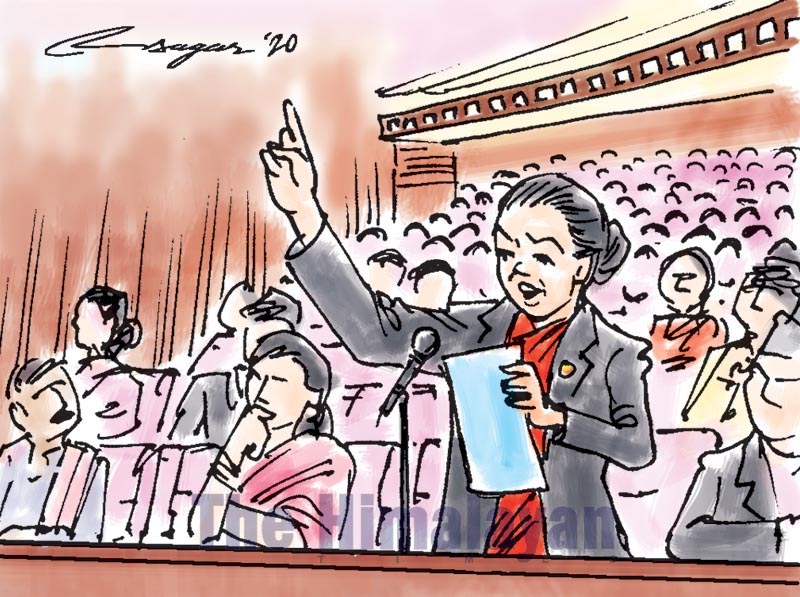Law-making: Role of parliamentary committees
If the committees are strengthened, the law-making process will be much smoother and more effective. It will also increase public engagement in law making and enhance both ownership and inclusion
The constitution has set out specific legislative procedures for making laws. Article 97 of the constitution states that the House of Representatives and the National Assembly of the Federal Parliament may form committees, as provided for in the federal law, to facilitate the law-making process. Article 104 of the constitution says that each House of the Federal Parliament can frame the Rules of Procedure to carry out its works.
Accordingly, there are three Rules of Procedures, which govern the functions, duties and responsibilities of both the Houses of Parliament. The Rules of Procedures are separate for the House of Representatives and the National Assembly, as well as for governing the joint meeting between the two. To facilitate the process of law formulation and passage, the Rules of Procedures have set up 16 committees -- 10 committees of the House of Representatives, four of the National Assembly and two joint committees – each of 24-26 members.
The 10 committees of the Lower House relate to Finance; International Relations; Industry, Commerce, Labour and Consumer Interest; Law, Justice and Human Rights; Agriculture, Cooperatives and Natural Resources; Women and Social welfare; State Affairs and Good Governance; Development and Technology; Education and Health; and Public Accounts. The four committees of the Upper House relate to Sustainable Development and Good Governance; Legislation Management; Delegated Legislation and Government Assurance; and National Concern and Coordination. The two joint committees are the Parliamentary Hearing Committee and State Directives Principles and Policy Monitoring and Implementation Committee.
Once a bill is registered at the Federal Parliament secretariat, it is circulated to all the parliament members within two days in case of a government bill and four days in case of a non-government one. A week after its circulation, the bill is presented at any of the two Houses for discussion on its principle. The Parliament then decides whether to send the bill to a concerned parliamentary committee or forward it for wider public consultations. After discussion on the principles, the MPs may move amendments within 72 hours. The House can send the bill, along with the amendment proposals, to the concerned committee.
The committee members will then start discussion on the bill and the amendment proposal. The committee will prepare its report and forward it to the House, which it may accept or reject. If it accepts, it can then pass the bill and send it to another House. A bill is endorsed only after both the Houses pass it. Subsequently, the Speaker authenticates the bill and sends it to the President for final issuance.
At the parliamentary committee, its chairperson calls a meeting of all the members and distributes the bill and amendments to them. It can invite concerned government agencies and stakeholders, including experts, for wider consultation. Rule 175 allows the committee to summon government ministers and officials of government agencies or commissions under their jurisdictions during clause-wise discussion. If there is no consensus, the committee can put the bill to a vote. It sends its report to the concerned House.
At present, the Federal Parliament needs to formulate over 300 new laws, out of which about 100 have been formulated. On average, each committee has passed only 3-5 laws till now. They have a huge responsibility but face many challenges. Around 80 per cent of the members of parliament are new and lack experience or expertise regarding law making, drafting and content.
There is also minimum practice of seeking technical support from experts on the content and drafting. There is also a dearth of serious study among the MPs. There is a tendency to move amendment proposals without adequate study and without any rationale. Most amendments are related to language and grammar rather than content. Political parties are not active in coordinating amendment proposals.
There is no mechanism to seek expert input. Each committee has 4-5 parliamentary staff, but they are not capable of providing technical support to the members. These were the reasons that led to controversies on bills such as the Guthi Bill, National Human Rights Commission Bill and Media Council Bill. This has hindered the smooth operation of democratic legislative exercise.
There is, thus, a need to provide orientation to the committee members on a bill by experts. It will help them to understand the content and move constructive amendments. Parliamentary parties should also start the exercise of regular consultations with subject experts. There must be deliberations with wider stakeholders on each bill so that different concerns of the stakeholders can be addressed. The staff of the parliamentary committees also need training and orientation on the bill-making procedure and content.
On bills of national importance, it is important for the party chief whips and the chairperson of the concerned committee to hold consultations with the top political leaders and the prime minister to expedite the bill. If the committees are strengthened, the law-making process will
be much smoother and more effective. It will also increase public engagement in law making and enhance both ownership and inclusion.
Pradhan is executive director, Nepal Law Society






